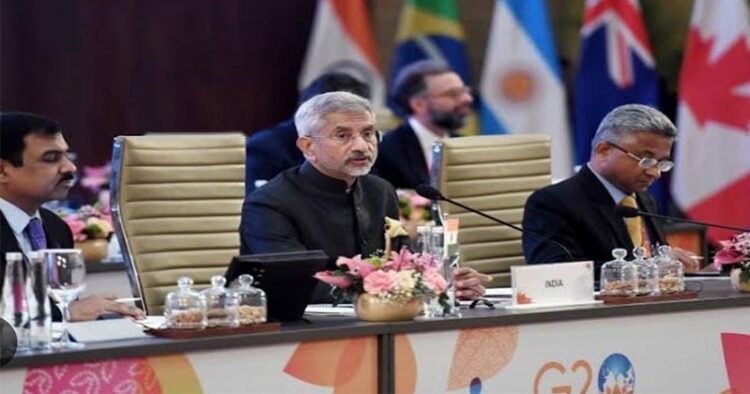New Delhi: The G20 Foreign Ministers meeting held in New Delhi on March 2 deliberated upon current global challenges, including climate change, food and energy insecurity, and global supply chain disruptions.
The chair’s summary and outcome document of the meeting said that the Foreign Ministers focused on issues like strengthening multilateralism, ambitious climate and environmental action.
They also sought to deepen cooperation on sustainable development, counter-terrorism, and disaster risk reduction. It said that the war in Ukraine has further adversely impacted the global economy, and there was a discussion on the issue.
“Most members strongly condemned the war in Ukraine and stressed it is causing immense human suffering and exacerbating existing fragilities in the global economy – constraining growth, increasing inflation, disrupting supply chains, heightening energy and food insecurity,” the document said.
Stating that security issues can have significant consequences for the global economy, the Ministers said it is essential to uphold international law and the multilateral system that safeguards peace and stability. This includes defending all the purposes and principles enshrined in the charter of the United Nations and adhering to international humanitarian law, including the protection of civilians and infrastructure in armed conflicts.
“The use or threat of use of nuclear weapons is inadmissible. The peaceful resolution of conflicts, efforts to address crises, diplomacy, and dialogue are vital. Today’s era must not be of war,” the document said.
The Foreign Ministers reaffirmed the steadfast commitments of G20 leaders to tackle climate change by strengthening the full and effective implementation of the Paris Agreement.
The G20 Foreign Ministers’ meeting here on March 2 did not come out with any joint communique owing to deep differences over the Ukraine conflict.
Last week, during the G20 Finance Ministers and Central Banks Governors (FMCBG) meeting, the member nations faced a similar lack of consensus on Ukraine.
During a press conference, External Affairs Minister Dr S Jaishankar said that issues concerning the Ukraine conflict were there among member nations. He said there were polarised views on the issue.
Sources said that the differences were mainly between the US-led Western nations and the Russia-China group on the other side over the Ukraine conflict.
Dr S Jaishankar said that the outcome document and the chair’s summary reflected the G20’s resolve to deal with pressing global challenges.
The G20 nations condemned terrorism in all its forms, and counter-narcotics was also discussed for the first time, the Minister said.
“We recall the Bali Leaders’ Declaration, where Leaders had reaffirmed that the rules-based, non-discriminatory, free, fair, open, inclusive, equitable, sustainable and transparent multilateral trading system, with the WTO at its core,is indispensable to advancing our shared objectives of inclusive growth”.
They also agreed that reforming the WTO is key to strengthening trust in the multilateral trading system.
It also said that the impacts of current global challenges are increasingly evident worldwide and felt most acutely by the poorest and those in vulnerable situations, including women and girls.
In this context, international development cooperation and partnerships, including among the developing countries, based on the spirit of multilateralism, using all available instruments and mobilizing all possible resources, can be essential in accelerating progress in effectively achieving the SDGs of the 2030 Agenda, the document said.




















Comments